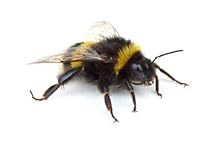 Paved roads and development in rural areas is adversely affecting ground-nesting bumblebees, an important native pollinator, according to research at The University of Texas at Austin and the University of California, Berkeley.
Paved roads and development in rural areas is adversely affecting ground-nesting bumblebees, an important native pollinator, according to research at The University of Texas at Austin and the University of California, Berkeley."Honey bees are declining precipitously, and wild bees have also been exhibiting population declines across the globe. Native bees provide critical pollination services for fruit, nut, fiber and forage crops," says professor Shalene Jha, lead author of a study suggesting management strategies that reduce the local use of pavement and increase natural habitat within the landscape could improve nesting opportunities for wild bees and help protect food supplies around the world.
The study also suggests that increasing the number of species-rich flowering patches in suburban and urban gardens, farms and restored habitats could provide pathways for bees to forage and improve pollination over larger areas.Animal pollination is estimated to be worth over $200 billion in global crop yields.
In addition to finding that pavement negatively affects the bees, the scientists discovered that:
> Bees will move longer distances to find patches of flowers that are rich in species; it's not floral density that determines how far a bumblebee will fly, but floral diversity.
> Bees will also forage further away from their home nest if the surrounding landscape is less heterogeneous.
 "In combination with earlier work showing that bumblebees have become rare in agricultural landscapes, our study suggests that farmers could promote these valuable pollinators by diversifying crop types and by planting cover crops and flowering hedgerows to enhance floral diversity," says environmental scientist Claire Kremen of the University of California, Berkeley.
"In combination with earlier work showing that bumblebees have become rare in agricultural landscapes, our study suggests that farmers could promote these valuable pollinators by diversifying crop types and by planting cover crops and flowering hedgerows to enhance floral diversity," says environmental scientist Claire Kremen of the University of California, Berkeley.Bumblebees nest in the ground, and each colony contains a queen and a force of workers. As with honeybees, all of the bumblebee workers are sisters who spend some of their time flying around searching for flowers from which to collect pollen and nectar to feed the larvae back in the hive.
Unlike honeybees, which are not native, bumblebees do not make harvestable honey. They do, however, provide important pollination services to plants.
Sources:
Claire Kremen, University of California, Berkeley; 510-367-2100
Shalene Jha, University of Texas at Austin; 248-719-5766
Farm Supply
Farm Magazines
When Fruit Trees Bear No Fruit
Artwork: Bumblebee
No comments:
Post a Comment